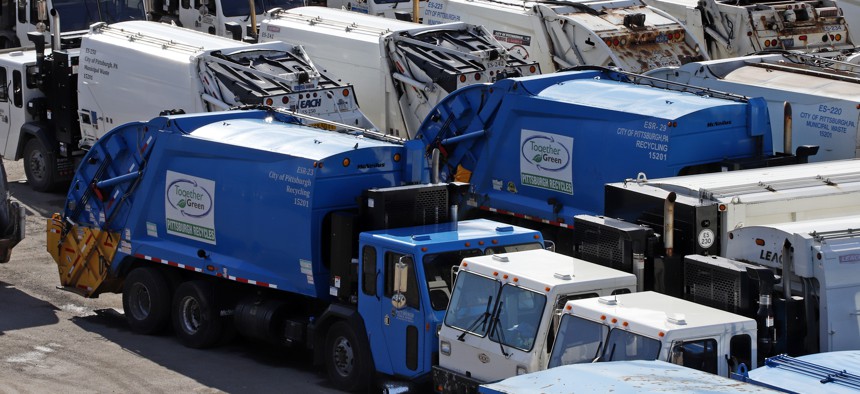Garbage Truck Driver Shortage is Creating a Mess for Solid Waste Agencies

"As the weather warms up, the garbage is going to get more fragrant and it will be more important for governments to get on this,” says one industry official.
Worker shortages are creating a mess for local waste management departments.
Communities across the country—from Flagler County, Florida to Virginia Beach, Virginia to Euclid, Ohio—have experienced driver shortages during the last few months that led trash or recycling to pile up.
The problem stems from competition for drivers for a range of other services—including Amazon and food and grocery delivery services that surged in demand during the pandemic, said David Biderman, executive director and CEO of the Solid Waste Association of North America.
“There are a lot more driver options now,” Biderman said.
The problem hasn’t been uniform nationwide, but instead has sprouted up “like a weed” in some communities, Biderman said.
SWANA recently published a paper that provides solutions solid waste departments can deploy to address the worker shortages.
In the short term, local governments can cut the frequency of recycling or yard waste collection or expand use of temporary workers to fill shortages. Long-term solutions include increasing pay for workers or marketing positions in new ways—for example, SWANA recommends advertising the stability of a career in local government in recruitment materials.
Solid waste departments can also purchase new garbage or recycling collection trucks with automated side-loading technology (which can cost between $30,000 to $50,000 more than manual rear loader trucks) in order to reduce the number of employees needed to operate vehicles. SWANA acknowledged that local governments may have to consider increasing fee collection rates or otherwise supplementing department budgets to implement some of the long-term strategies.
But solid waste labor shortages are an important problem to tackle, especially as the summer heats up, Biderman said.
“As the weather warms up, the garbage is going to get more fragrant and it will be more important for governments to get on this,” he said.
Route Fifty spoke to solid waste officials in two communities— Scott County, Iowa and Charlotte, North Carolina—about recruitment and retention strategies that they say have helped the agencies weather the labor shortage.
New Marketing and Outreach in Scott County
The Waste Commission of Scott County oversees municipal solid waste collection, a recycling drop off, and an electronics recovery center but does not provide residential trash services. The commission has 72 full-time employees and while there are only four current vacancies, recruitment has become difficult, said Executive Director Kathy Morris.
Since the pandemic started, the applications for sorter positions at the county’s recycling facility have plummeted by about 80%, Morris said. For a recent round of hires, six applicants were selected to come in for interviews but only two showed up.
The problem isn’t unique to the county government, but highlights the challenge facing employers in the larger Quad Cities region, Morris said.
“There’s never been so many help wanted signs. Everyone is scrambling a little bit,” she said.
To ensure the Waste Commission has the workers it needs to process the county’s trash and recycling, Morris has implemented new initiatives to boost recruitment interest.
The county pays $12.55 an hour for seasonal positions that work in various capacities at commission facilities (a wage Morris said is competitive for the area) and is now offering a $250 hiring bonus to new employees who stay on for at least six months.
Job assignments for temporary workers could include roadside litter collection. To make sure that work still gets done even during the labor shortage, the commission is partnering with community organizations. Groups like Boy Scout troops or high school organizations fill the gap through volunteer clean up events and the commission has made donations to the groups in exchange for their work.
Morris is also in the process of creating video advertisements for social media that include employee interviews and highlight the variety of the jobs available. The initiatives have all been able to be paid for through the commission’s budget.
“Sometimes in the waste industry, people have a negative connotation of the kind of work that would be done,” Morris said. “We have good positions and we want people to see what we are doing.”
Charlotte’s Driver Training Program
Charlotte’s 316-person Solid Waste Services Department is responsible for weekly residential trash pick up and biweekly recycling. Deputy Director for Operations Eric DeLaPena said his department hasn’t felt the effects of the labor shortage and he credits the city’s previous investment in workforce development.
The department has traditionally relied on a temp agency to provide workers for trash and recycling “helper” positions that assist with collections. When a permanent position opens, the department looks to that worker pool for potential full-time hires.
“We already know their work ethic and their performance,” DeLaPena said.
The department can also train helpers or sanitation technicians as commercial drivers licensed to operate trash or recycling trucks.
Training at a commercial driving school can cost several thousands of dollars, so offering the training at no cost to solid waste department employees serves as a great training and retention tool, DeLaPena said. Because the city employs driving instructors (Charlotte’s instructors are also in charge of overseeing safety compliance within the department) there is no additional cost to train drivers.
Due to the popularity of the in-house program, the city increased the number of driver trainings it offers a year from two to five sessions. The program has kept vacancies low because it creates a steady pipeline of talent and other city agencies, including the department of transportation, are looking to replicate the program, DeLaPena said.
Andrea Noble is a staff correspondent with Route Fifty.
NEXT STORY: Winners and Losers of the Work-From-Home Revolution





